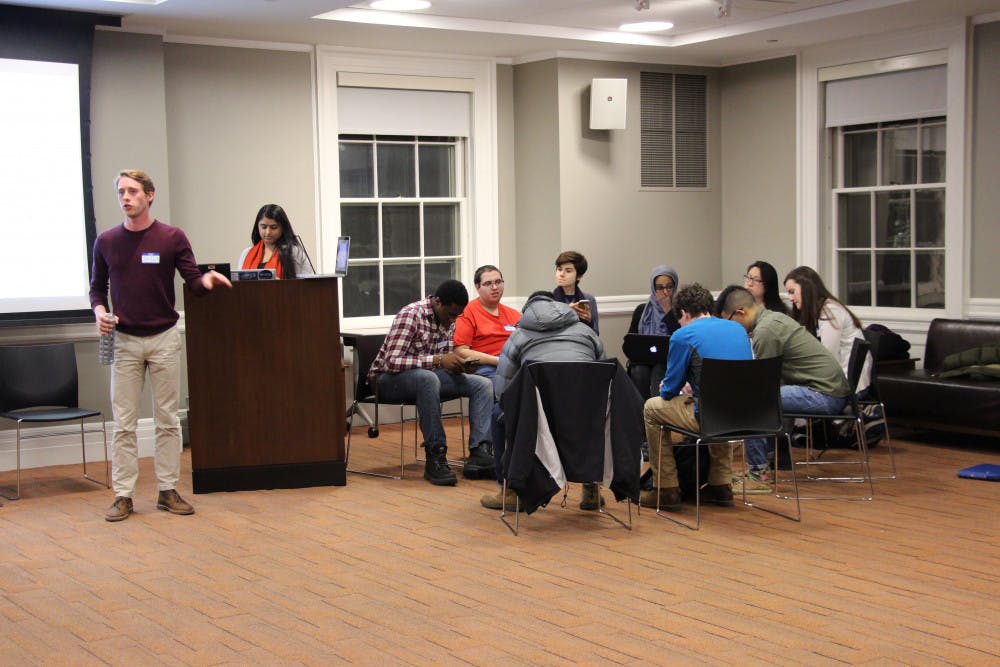Members of the University Resources Committee spoke at the general body meeting of the Undergraduate Council of Students Wednesday, touting the committee’s priorities of maintaining financial sustainability, creating a diverse campus and fostering academic excellence in constructing the University’s operating budget for the 2016-17 school year.
“We took a new approach this year with a new provost coming in and some financial challenges ahead of us,” said Vice President for Academic Finance and Administration Lindsay Graham.
URC made an effort to “really understand the moving parts” of the budgets of different departments and centers, Graham said. The committee evaluated budgetary requests of those units against its priorities in order to emphasize efficiency, he added.
To these ends, addressing rising costs across the board was a main focus of the committee, said Executive Vice President for Finance Barbara Chernow. Brown ranked sixth-most affordable on a list of 20 elite universities in total student charges, according to the URC’s annual report.
“We wanted to keep Brown as affordable as possible,” Chernow said. “We believe we’ll remain in this (lower) quadrant.”
The Educational and General budget’s deficit is projected to hover around $4.5 million for the upcoming fiscal year, representing a 60 percent drop from the current one, according to the report. The URC aims to eliminate the deficit completely by the 2018 fiscal year.
Undergraduate members of the committee noted that the procedure for finalizing the budget was markedly more effective than in the past. “This felt like a more streamlined process,” said URC Representative Justice Gaines ’16.
“We all had our voices heard, and we came up with a budget that we are proud of,” added URC Representative Ben Miller-Gootnick ’17.5.
The student representatives highlighted a number of notable changes to the budget that will have an immediate impact on the student body. For example, the URC recommended an elimination of the suite fee for suites that do not include a kitchen, said Christian Hanson ’17, a URC representative.
International students on financial aid, previously awarded just one University-financed trip home over the course of their four years, are now allotted one trip per year, Gaines said.
Financial aid continues to occupy a prominent place on the agenda of the committee. The budget for financial aid has seen an average annual increase of 8.9 percent over the last eight years, with the percentage of students on financial aid rising from 40 to 44 percent over that timeframe, according to the report. “Not only is it more students, but it’s a more diverse group of students,” Chernow said.
The proposed budget for the upcoming year includes $120.5 million for undergraduate financial aid, representing an increase of 7.1 percent since last year. “There is an understanding that Brown needs to work harder to increase financial aid overall,” Graham said. “The goal is to be as competitive as we possibly can.”
UCS general body member Andrew Kutscher ’18 asked about the role of the Annual Fund and endowment in the consolidated budget. The endowment constitutes 19 percent of the budget, signifying“tremendous support,” Chernow said. But, she added, its 5.7 percent return on investment last year placed Brown behind many of its Ivy peers. According to the International Business Times, Yale’s endowment saw an 11.5 percent return, Princeton 12.7 percent and Dartmouth 8.3 percent.
Graham emphasized the importance of the annual fund in budgetary matters. “It is, in essence, unrestricted money,” he said. “Its fungibility makes it attractive.”
UCS members offered ideas for the priorities of the URC moving forward. UCS Vice President Alana Bhatla ’16 mentioned making buildings on campus more accessible, and UCS Treasurer John Brewer ’17 highlighted continued support for mental health resources.
The URC members overwhelmingly praised Provost Richard Locke P’17 and the Corporation for their work with the budget. “Financial challenges are still before us,” Graham said. “We took a major step in the right direction, but we still have a few more steps to go.”





